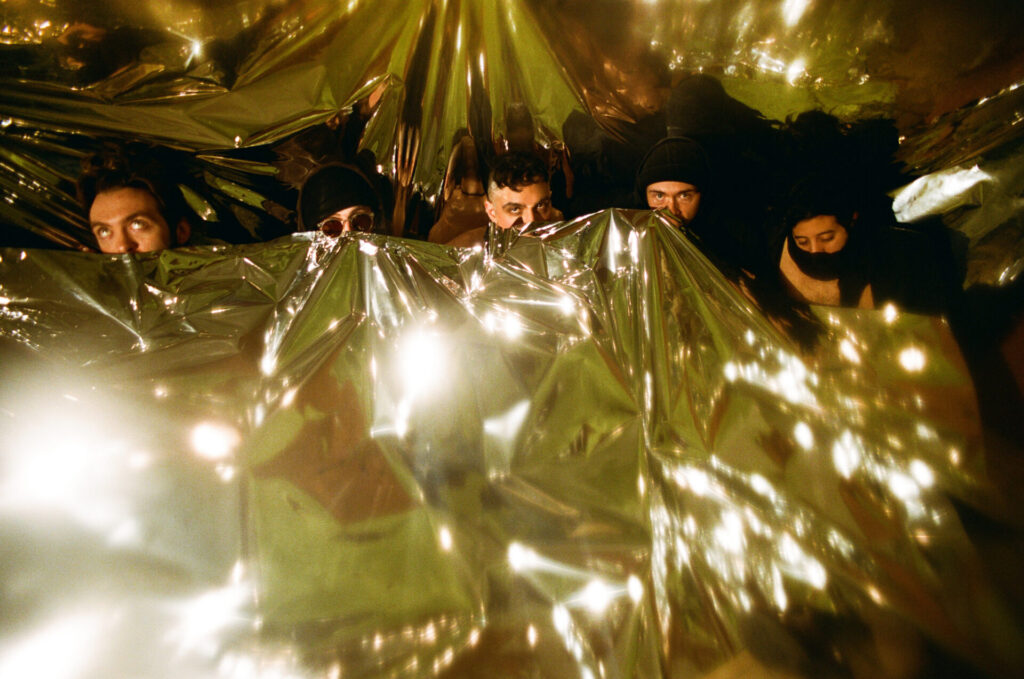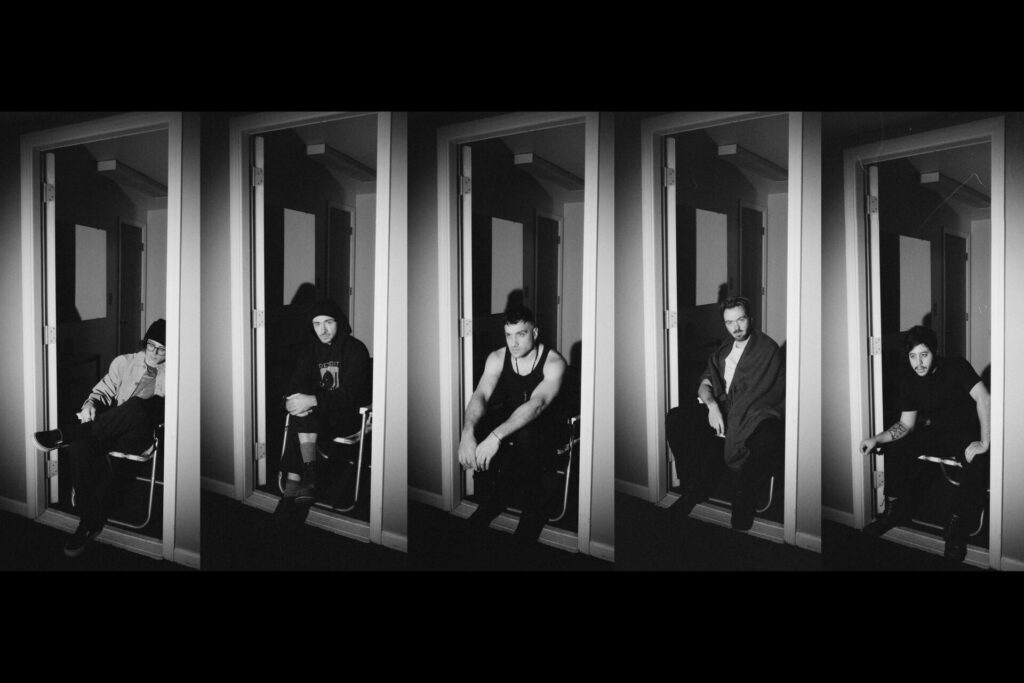“The oud sounds too bassy,” the sexagenarian oudist says, nodding towards Moe, one of the founders of Dearborn, Michigan’s premier – possibly only? – noise rock outfit, Prostitute.
“Too bassy?”, Moe echoes back, getting up from his chair to have a look, to maybe provide some assistance. The oudist is warm and grandfatherly, and probably is someone’s grandfather.
“I don’t know what to do. Just last week I had the settings on these boards just the way I want.” The oudist shakes his head as Moe assesses the situation.
“A little tech support,” says Andrew, also a founding Prostitute. He (on drums and sampler) and Moe (on vox, keys, sampler, and guitar) are the lyrical duo behind their incendiary – some might say inflammatory – jams. Andrew chuckles as Moe studies the oudist’s mixer, trying to help. Don’t let the confrontational name and scary music fool you, Prostitute are nice guys doing their best.
We’re sat, the three of us, at a circular four-top in a café specialising in Turkish sweets, only a few feet from a small stage currently occupied by the vexed oudist, and not five minutes from my home. It’s the last Friday in January. Outside, it’s snowing sideways, the streets are a nightmare. Inside, we’re warm, drinking coffee and tea, bathed in light from colourful glass lanterns, stuffing ourselves with pistachio treats, doner, and warm simit filled with cheese. We’re here because the five-piece is having a moment. After a leg-up from Shigeto and then The Armed, Prostitute have developed a reputation for ecstatic live performances. Now, nearly four months after its release, their bracing debut Attempted Martyr is still gaining momentum – garnering recent praise from both Pitchfork and Anthony Fantano – in a way that seems unlikely and frankly surprising in our contemporary churn-and-burn media ecosystem.
“It’s totally unexpected,” says Andrew. “We just shoved the album out there. We’d been working on it for four years – it was just driving us crazy.”
“We almost killed each other,” adds Moe. “Every day, we were at each other’s throats. Every day was a problem.”
“Every line, every word,” notes Andrew.
“Every word and everything,” says Moe in between bites of doner, “fought over continuously.”
“There was no rollout plan,” Andrew continues. “There were no connections. We had been building a following through the shows, so I expected there to be an audience for it, but to my surprise, once people got their hands on the final project, it really took off. People got what we were trying to do. And given the zeitgeist right now – unfortunately – it’s kind of the perfect moment.”
Ah yes, the “zeitgeist”. In my lifetime, the zeitgeist has rarely, if ever, been kind to Dearborn. Off the top of my head and by no means comprehensive: The Gulf War, 9/11, the Iraq War, Afghanistan, pig-head brandishing Evangelicals in the early-to-mid 2010s, the alt-right later, Trump, Israel’s genocide in Gaza and military affronts in Lebanon and Syria, Trump again – it’s all affected Dearborn, come down on the marginalised communities here. But perhaps some context is in order.
Dearborn is one of the older cities in Metro Detroit, settled in the late 18th century, incorporated in the late 19th, with a population of mostly European descent. The 20th century brought Ford Motor Co. and systemic racism at the hands of segregationist mayor Orville Hubbard, who served for 36 years, from 1942-1978. Though home to Arab Americans from Lebanon and Syria since the early 1900s, beginning in the late 1960s, Dearborn’s Arab American population began to grow more and more rapidly – and more and more diverse, taking in immigrants from Yemen, Iraq, and Palestine – as people fled a succession of calamities in their home countries. Now, Dearborn is roughly 55% Arab American, home to the largest mosque in the country, and the largest Lebanese American community in the States. Despite Hubbard’s legacy – and its unrelentingly beige architecture – Dearborn has become a vibrant and supportive and resilient multicultural place. It’s also othered and scapegoated and targeted by reactionaries of every stripe – and at most every level of government.
“The Wall Street Journal!”, Andrew exclaims.
“There was that Wall Street Journal article!”, Moe echoes. “Did you see that? Crazy!”
“Completely unhinged,” Andrew concludes.
They are, of course, talking about the opinion piece, “Welcome To Dearborn, America’s Jihad Capital”, the contents of which don’t merit much discussion, except to say that it’s caricatures like this that Prostitute are reacting against with Attempted Martyr, a concept album boiling over with cathartic vitriol.
“A lot of the anger,” offers Moe, “especially on the album, is inspired by what happened in this area after 9/11 – the vilification of Arabs. My family was threatened. After that, I guess I just didn’t feel comfortable being who I was. So, what we’re doing now is an attempt to shove it in their faces and say, ‘You know what? I am what you think I am.'”
“When we started this,” adds Andrew, “it was right before the pandemic hit. Most of Attempted Martyr was conceptualised and written while that was going on. Obviously, it speaks to what’s happening in the Middle East right now, but a large part of it was just capturing the atmosphere of the time – seeing the wheels fall off, seeing the house on fire all over the world. Even in the character that’s being portrayed on the album, we’re not just taking this negative stereotype of Arabs and exaggerating it, making it into our caricature, but also playing into the rhetoric of the times, where everything’s extreme.”
You can hear it on the record. With its bleating and reedy samples, insistent and nervy instrumentation, all-pervasive heaviness, and borderline deranged vocal delivery, Attempted Martyr captures the precarity and anxiety that seems to accompany every aspect of day-to-day life, that permeates everything and gets worse by the minute.
“That’s the intention,” Moe says.
“That’s what we’re living through,” adds Andrew. “I mean, shoot, I have student loan debt hanging over my head. I think for most people, it feels like there is no future – it’s just been dissolved. The ground beneath us is dissolving away.”
“Listen,” Moe leans in, “You-Know-Who murdered some of my family, some people we know. Since that happened, I think now more than ever, stuff like this is important. It’s not necessarily for our political beliefs, but we’ve been getting hit up by so many people who this, for some reason, emotionally affects. We held a benefit gig at [Detroit’s] UFO Bar for Lebanon and some of our family and friends. And I saw a lot of people crying, coming up to us, saying, ‘Thank you for this.’ There’s just not a voice for these people. And especially here, it’s very hard.”
As we talk, it becomes clear, obvious even, that Prostitute’s bonds to their community and to each other are real and strong – not for clout or cred or incidental. They’re essential to the band’s identity. The way that Moe and Andrew communicate, it’s clear they’ve got deep history. It’s almost familial.
“I dated his sister,” Moe says laughing. “Didn’t go over too well, but I used to see him all the time around the house, right? And I thought, ‘This is a cool looking dude. He’s from Ann Arbor…'”
“I’m not from Ann Arbor,” Andrew interrupts.
“He looked kind of Ann Arbor-ish,” Moe offers.
“I was there a ton,” Andrew concedes.
“I was young, impressionable,” says Moe. “I was like, ‘You know what?’ So, I harassed him until we started talking.”
“And started doing music together,” Andrew says. “That went on for a few years – nothing serious. Eventually, he harassed me enough to abandon being a teacher for the music thing. He made a convincing argument. He’s like, ‘You really want to spend the rest of your life getting picked on by high schoolers?’ And I’m like, ‘Fair point.'”
“I started this pretty late,” Andrew continues. “I was already in my late twenties. Like, what am I doing in a band? But I got laid off during COVID. So, I thought, ‘OK, I’m gonna make something happen with my life. I’m gonna do something I’m proud of. This is it.’ So, there was this – on a personal level for both of us – desperation.”

At this point, I can’t help but wonder if their intention is to make a living with music, to ditch the day job.
“DefiniteIy,” says Andrew conclusively. “I think that’s what gave the entire process that air of desperation. It’s like, ‘I can’t keep doing this.’ I mean, we could, but we knew we weren’t going to be happy. I come from a single mother household. Not a lot of money growing up. For Moe, too. So, it seemed like an inevitability that was what life was going to be: ‘You’re going to work, you’re going to be unsatisfied, and that’s it.'”
“So, we figured it out as we went along,” Andrew says. ” The only thing we had from the beginning was, ‘OK, we want to be this Arab punk band.’ We had this song ‘All Hail’, and we had this one lyric about the Twin Towers, and that was it.”
“What started bringing the concept into focus was, I stumbled across this article about Hamaas Abdul Khaalis, [the 1973 Hanafi Muslim massacre, and the Hanafi Siege],” Andrew continues. “That seemed to be a strange synchronicity – how it played right into ‘All Hail’, which was really the starting point of the album. From there, we started building out this character of the Zealot.”
“The character,” says Moe, “is this Arabian prince who thinks he’s top shit. Who thinks he’s God but just wants everyone dead.”
“What do you think?”, asks Moe, turning to Andrew. “That’s a good way to put it, no?”
“Yeah,” answers Andrew. “I mean, I look at it a little bit differently. The way we did the lyrics, Moe had his own set, and I had my own set, and we mashed them together – while also ripping off other ideas. Yeah, there’s a character there, there’s a concept, there’s a bit of us in there. At the same time, as a narrative, I don’t know if it’s cohesive. Sometimes, to me, it feels like this is one character in a linear story. Other times, it feels like vignettes of different characters in different situations.
“But yeah, you’re right,” Andrew concludes, turning to Moe. “I guess the album title sums it up: Attempted Martyr. He has some delusion of a higher calling, but what he’s actually in service of is ego and gluttony.”
Moe and Andrew have a knack for button-pushing. Were Prostitute properly famous, were someone to clue in the reactionary pundit class to the group’s whole deal, they’d likely have a field day. Thousands upon thousands of pointless words would erupt onto the internet, a rage-bait Vesuvius. But there’s more to it than that – this isn’t simple button pushing. These songs swirl and churn with righteous anger, impish playfulness, and straight-up bravado – all executed poetically and with intention. And laid to tape with equal parts craft and abandon. Prostitute as an identity, as a concept, seems remarkably fully formed. “How long did it take to dial that in?”, I ask.
“The first year that was pretty much done,” says Moe.
“But then we had to reverse engineer what we had in our head,” Andrew clarifies. “At the beginning, it was just the three of us: me, Moe, and Dylan, our bassist. And then we brought on a guitarist, Ross, and then a second guitarist, Bret, who filled in on bass for some of the songs.”
“We had never really done any live shows. So, we had to figure out how to be a band. We had to figure out how to take samples and blend them with the guitar and blend them with live instruments.” Andrew sighs. “Yeah, this album has been hanging over our heads for a while.”
Over the years, I’ve come to realise that the Metro Detroit music scene is in love with its own mythology, making it hard for artists to break out of templates drawn up by their deified predecessors – and even harder for the scene as a whole (whatever that means) to expand beyond certain kinds of rock music or certain kinds of techno.
“It’s just copycats all over the place,” says Moe.
“I mean, I get it,” Andrew says, offering an olive branch. “There’s a history here, and there’s a tradition here, but rock is already so beholden to that. Even more so in Detroit. It seems like that’s all that people want to do.”
One of the more refreshing aspects of Attempted Martyr is how it deals with the weight of that history. On tracks like album highlight ‘Judge’, with its lock-groove riff, you can hear those canonised influences – The Stooges, MC5, etc. But the lens is totally different. The perspective has completely changed. Prostitute are looking at these things from a skewed angle. They’re refracting them. You get the sense that they want to push their music in the same way they push buttons.
“[On the next album] we’re pushing it way further, for sure,” Moe confirms. “It’s gonna get to a point where it’s completely offensive and insane – and just dance. It’s wild, OK? Going full, full, full Middle Eastern with it. It’s gonna be a party.”
“For sure”, seconds Andrew. “I mean, not to trash the first album. We’re very proud of it. But some of the influences on it are pretty obvious. You can pinpoint them. And that’s a reflection of what our tastes were at the time, and where we were at when we started the album. But four years later? I know Moe is tired of rock music and guitars. I’m starting to get tired of it, too.”
“The reason why the first album has so many Eastern Asian, West African, Middle Eastern sounds in it is because, when we started this band, the push was to make rock music,” says Moe, gesturing to Andrew. “That’s what Andrew was interested in. He got me interested in that. And I love The Stooges and Fun House and The Rolling Stones. But I was tired of guitar then – and especially now. I think guitar can do cool things, but the way it’s being done in the West is just kind of derivative. Like, the Tuareg people in North and West Africa are doing crazy shit with guitar. So, we wanted to approach rock music in a way that’s like, ‘This is unique – you don’t really hear this too often.'”
By now, we’ve been talking for over an hour. The café’s completely full up. Lively. Groups of friends chatter politely, deferring to the oudist, who has sorted out his kit and started playing. Suddenly, I remember that I’m meant to ask them about their name. Prostitute. Not designed to make friends.
“It’s a verb,” they say, almost in unison. “The act of prostituting oneself.”
“Like, in relation to day-to-day existence under late capitalism or?” I’m gently prodding here, but it turns out that’s it. Well, not entirely. The guys aren’t just referring to selling yourself to the boss for some ducats, they’re talking about offering yourself up to the Big Guy, too. To be honest, their answer is more thoughtful than I expected it to be. But then, everything about these two has been more thoughtful than I’d typically expect from noise rockers. No offense to noise rockers intended.
Moe is waiting for more doner. I’m waiting for a takeaway order of baklava with fresh ice cream. I mention the time I saw an old Polish lady accosting one of those pork-packing Evangelicals I mentioned earlier. “It was cool but somewhat unexpected to see her stick up for her Muslim neighbours like that,” I say. A sign of a newer, better Dearborn.
“That’s our band,” says Moe. “Ross and Bret are Polish. Andrew’s Roma. And Arab, also.”
“Allegedly,” Andrew interjects.
“Dylan is Maltese,” Moe continues. “That’s what it’s about.”
That’s Dearborn, right?
“It’s beautiful,” Moe concludes.
Orville Hubbard’s rolling in his grave. Good.



